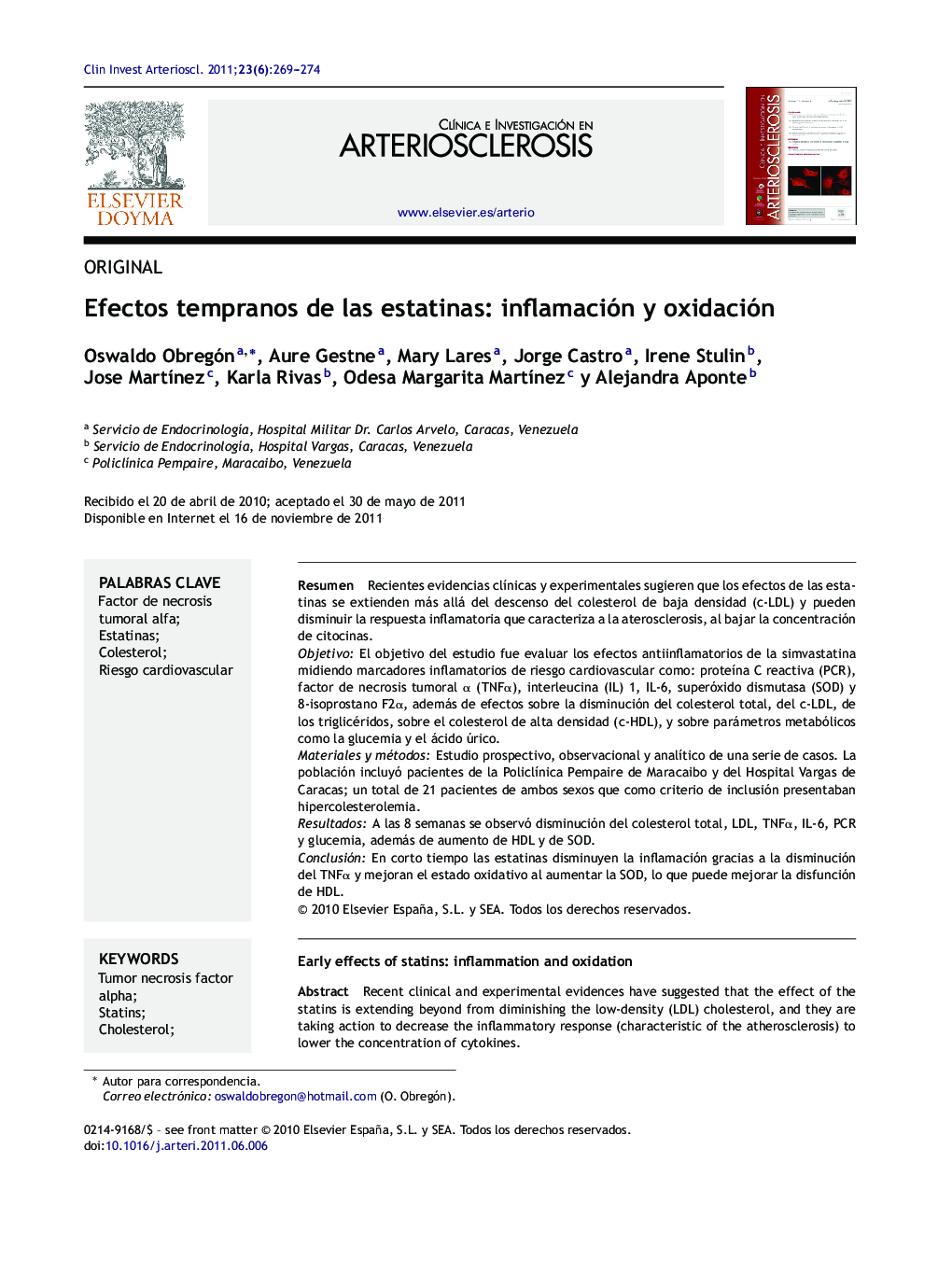| کد مقاله | کد نشریه | سال انتشار | مقاله انگلیسی | نسخه تمام متن |
|---|---|---|---|---|
| 2839676 | 1165207 | 2011 | 6 صفحه PDF | دانلود رایگان |

ResumenRecientes evidencias clínicas y experimentales sugieren que los efectos de las estatinas se extienden más allá del descenso del colesterol de baja densidad (c-LDL) y pueden disminuir la respuesta inflamatoria que caracteriza a la aterosclerosis, al bajar la concentración de citocinas.ObjetivoEl objetivo del estudio fue evaluar los efectos antiinflamatorios de la simvastatina midiendo marcadores inflamatorios de riesgo cardiovascular como: proteína C reactiva (PCR), factor de necrosis tumoral α (TNFα), interleucina (IL) 1, IL-6, superóxido dismutasa (SOD) y 8-isoprostano F2α, además de efectos sobre la disminución del colesterol total, del c-LDL, de los triglicéridos, sobre el colesterol de alta densidad (c-HDL), y sobre parámetros metabólicos como la glucemia y el ácido úrico.Materiales y métodosEstudio prospectivo, observacional y analítico de una serie de casos. La población incluyó pacientes de la Policlínica Pempaire de Maracaibo y del Hospital Vargas de Caracas; un total de 21 pacientes de ambos sexos que como criterio de inclusión presentaban hipercolesterolemia.ResultadosA las 8 semanas se observó disminución del colesterol total, LDL, TNFα, IL-6, PCR y glucemia, además de aumento de HDL y de SOD.ConclusiónEn corto tiempo las estatinas disminuyen la inflamación gracias a la disminución del TNFα y mejoran el estado oxidativo al aumentar la SOD, lo que puede mejorar la disfunción de HDL.
Recent clinical and experimental evidences have suggested that the effect of the statins is extending beyond from diminishing the low-density (LDL) cholesterol, and they are taking action to decrease the inflammatory response (characteristic of the atherosclerosis) to lower the concentration of cytokines.ObjectiveThe objectives of the study were to evaluate the anti inflammatory effects of simvastatin by measuring the inflammatory cardiovascular risk markers such as: C-reactive protein, tumor necrosis factor (TNF), interleukin 1 (IL-1), interleukin 6 (IL-6), superoxid dismutase (SOD) and 8-isoprostane F2α, and to evaluate its effects on the reduction of total cholesterol, cholesterol of low-density (LDL), triglycerides, high-density (HDL) cholesterol and the metabolic parameter; such as glycemia and uric acid.Materials and methodsA prospective, observational and analytical study of a number of cases was performed. Population was 21 patients of both sexes, presented as a criterion for inclusion of hypercholesterolemia. It was included patients from the Policlinica Pempaire Maracaibo and Caracas (Hospital Vargas).ResultsAfter 8 weeks of treatment it was noted decreasing of the total cholesterol, LDL, TNF, IL-6, PCR and glycemia, beside the increasing of the HDL and SOD.ConclusionIn a short time the treatment with statins have decreased the inflammation, represented by the decreasing of the TNF and improving of the oxidative state increased SOD which can improve HDL dysfunction.
Journal: Clínica e Investigación en Arteriosclerosis - Volume 23, Issue 6, November–December 2011, Pages 269–274